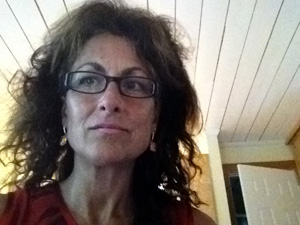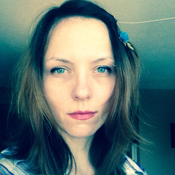Remembering Hinges on the Dark:
Melissa Stephens in Conversation
with Christine Wiesenthal

Malahat volunteer Melissa Stephens talks with University of Alberta professor Christine Wiesenthal about the mythic and the scientific in her poems, "Staphylococcus" and "Salmonella," both recently published in Issue 190, Spring 2015 of the Malahat.
You're both a creative and academic writer. Are these distinctive crafts for you? Does your creative publication history ever influence or shape the direction and venue for your academic publishing?
Are they distinctive? Yes and no, I think! Yes, in the sense that critical/academic writing comes from a more conscious place of intention and deliberation—and usually more systematic research, in advance or alongside the writing. The experience or impulse that feeds creative writing is less predictable. What you think you want to write about, and how, and what you actually do end up writing, and how—they are most often very different things.
That said, there's definitely a push-pull between the two types of writing. Critical reading and writing, just by deep immersion in language and ideas, can often serve as a path back to creative writing for me if I've been out of practice for a while, or feel like I have nothing to write. And creative work, in turn, does sometimes provide impetus for my academic publications. Some of my most recent academic publications and conference papers have actually been on teaching creative writing, which sort of brings the two orbits into overlap.
Your poems "Staphylococcus" and "Salmonella" engage with both mythological and scientific references. What is your interest in this relationship?
I suppose one thing that draws me is just the contrast between mythopoetic and scientific approaches or worldviews: imagination or dream versus rationalism, of course, but also the completely antithetical premises about control that underlie each. The whole methodology of empirical science is literally predicated on the notion of control—controlled experiments, controlled outcomes, logic and consciousness themselves as modes of control. That is so reassuring in comparison to the old stories where suddenly – poof! people get turned into trees, or married off to some underworld god. The acceptance by animistic societies of human vulnerability to greater and mostly inexplicable powers—our general lack of control over a lot of basic things about our existence—is a mindset I don't think we can fully inhabit or comprehend anymore. That in itself intrigues me; it's an acceptance that seems admirable, brave, and somehow lost, or at least not fully recoverable to us now.
Reviewing the titles of each poem, I am struck by how "bacteria" links these poems thematically, as does a possible interest in the impact of medical gazes. Can you comment on the titles chosen for these poems, and how they inform the works?
These two poems are actually part of a longer suite of sonnets (sort of) called "Micro-Autobiographical." I had intended to signal that in the publication! They're all titled after the bugs, who are the fictitious speakers. Some of the names, like "C. difficile," suggest a distinctive personality to me; some, like "E. coli," suggest a modern predicament or situation—we hear about contamination of the food chain supply or illness due to improper food handling all the time now, it seems. And others, like "Salmonella" or "Yersinia pestis" (the scientific name for the Black Death plague), come trailing fabulous, sometimes obscured, histories—like the fact of Salmonella being named not after its discoverer, poor Theobald Smith, but his boss. Those sorts of erasures interest me. The mood and voice of each poem arises from playing around with the names, and sometimes, what I've learned about the history and nature of these microbes. The feminine ending of "Salmonella" pretty much over-determined the gender of that speaker!
Your writing career has demonstrated a critical and creative commitment to nonfiction, poetry, and life narrative of various kinds. To what extent do you experiment with auto/biography or with life writing in these poems? Is there a temporality or life span for the speaking subjects?
This question gets right to the heart of what I think of as the fun challenge of these poems: I like the "auto-biographical" mode here in combination with the restraints and artifice of the sonnet form. There's a tension introduced by the notion of a dramatic lyric, or "lyric/anti-lyric" to think of Doug Barbour's term. Jo Shapcott has a marvelous series of "mad cow" poems that play off this same tension. And the short form is essential too—the idea of trying to "contain" something infectious or autonomous, a life form that can always threaten to "break out," as some of the poems do, spilling over the fourteenth line.
Elsewhere, you've said that writing a poem often begins with an image. What compels you to seize upon a particular image and to develop it? Is there a kernel image motivating these works?
These particular poems are less image-based than some of my other work, although I did look at some microscopic images. A lot of microbes and bacteria are gorgeous formations. When it's magnified, even slime mold is astonishingly beautiful to look at.
Are these poems (to be) part of a larger work or poetry? In what ways do other genres influence your poetry?
I'm not sure if this particular cycle of "Micro-Autobiographical" characters is done or not; there might be one or two additions yet. Lately the poems I've written do seem to relate to science or technology in some way, so maybe a coherent collection will emerge from the stuff I'm (slowly) accumulating. I'm pretty much an unruly magpie where it comes to reading, and any generic 'influences' would reflect that eclectic reading, I think. I do like to work with intertexts, though; any sort of material that works to combust with words on the page, it doesn't matter what it is, I'll grab it gratefully. I also like obsolete and archaic things, so historical literary forms like the Renaissance anatomy or 19th-century domestic manuals or medical texts are cat nip to me. Sometimes sources like that come out in the poems.
"Staphylococcus" ends with the image of blowing chalk and smoke, while "Salmonella" suggests that 'remembering hinges on the dark.' In what ways do these final lines speak to storytelling processes, in general, and to life writing in particular?
I really love this question. I love it in part because it supplies its own best answers! Storytelling is about smoke and mirrors, isn't it; art in general as pulling off some illusion, like Gwendolyn MacEwen's "magician with slow wrists." And life writing is necessarily preoccupied with memory, more than ever it seems. (Maybe because we outsource increasing amounts of it to our computers' memory chips now?) There are so many different theories about memory—what it is, when it happens, why it happens (or not), how it happens, what strange transmogrifications occur with time, age, illness, trauma. Patricia Hampl has a great essay on that, titled "Memory and Imagination," in which she gently inquires after one of her own innocent fabrications, as recalled from childhood. She speculates how the original emotional experience behind the formation of a memory gets "estranged" from the "memory image" over the years, like forking paths. That makes sense to me. The way our minds manufacture subjective truth—or sometimes leave us in that truly awful lurch where we genuinely cannot tell what we "truly" experienced or not—I guess it's just pretty fundamental territory for any genre that wants to make some sort of claim as "nonfiction." Poets can worry a little less about this.
I find that these poems capture a sense of uncertainty and suspicion, but they also allow for sensuality, humour, and perhaps even irony. How do these poems feel to you?
Tough one! It may be too early to say—sometimes I need to live with work for a while once it's published, before I can register a spontaneous "feeling" about it. All I know is that the process of writing them felt every bit as varied as the question suggests: fun, but at times also frustrating in a way that only working in traditional poetic forms can be.

Melissa Stephens
* * * * * * * *









